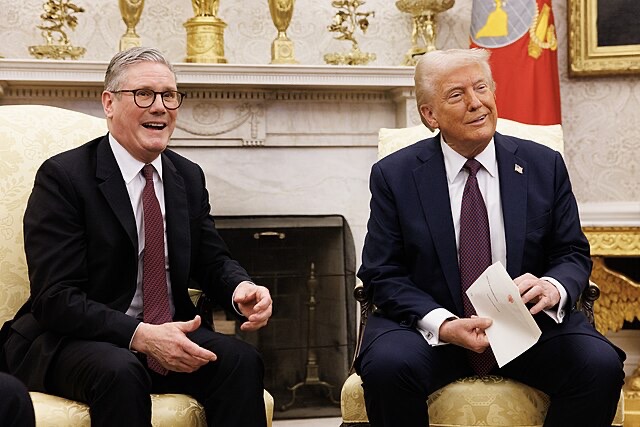In a dramatic turn of events, former U.S. President Donald Trump has firmly rejected UK Prime Minister Keir Starmer’s last-ditch appeal to halt looming trade tariffs, raising fears of a full-blown trade war between the two allied nations. As if the tension over transatlantic trade weren’t enough, Labour is simultaneously battling a fresh wave of criticism over its stance on free speech. These two political firestorms have put Starmer’s leadership under intense scrutiny, just as his administration aims to position Britain as a global economic and democratic force post-Brexit.
This article unpacks the layered dynamics behind Trump’s tough stance, what it means for the UK’s fragile economic recovery, and how Labour’s free speech woes are reshaping the national conversation on liberty and leadership.
Trump Rejects Starmer’s Appeal
Keir Starmer made an urgent diplomatic overture to Donald Trump, urging restraint amid growing threats of tariffs on British exports. The eleventh-hour plea aimed to de-escalate a rapidly developing situation, with American trade officials reportedly planning sweeping tariffs in response to the UK’s stance on digital taxation and regulatory disputes.
But Trump—never one to shy away from flexing America’s economic muscle—shut the door on the request. Sources close to his circle say Trump views the tariffs as a necessary correction to what he calls “anti-American policy moves” from Downing Street. In typical Trump fashion, his rejection was blunt, unapologetic, and rooted in his long-standing belief that trade deals must benefit the U.S. first.
For Starmer, who hoped to secure a diplomatic win, the response couldn’t have come at a worse time. Not only does it threaten the UK’s fragile trade routes post-Brexit, but it also highlights how strained relations with Washington could get if political ideologies clash further.
Potential Impact of US Tariffs on the UK
With Trump signaling support for new tariffs, UK industries are bracing for impact. The sectors most at risk include automotive, pharmaceuticals, whisky, and agricultural products—all heavily reliant on smooth transatlantic exports. A sudden tariff hike could mean billions in losses, price hikes for consumers, and layoffs across several regions.
Trade analysts warn that even a modest tariff could disrupt supply chains already weakened by Brexit and the COVID-19 pandemic. British-made goods could lose their competitive edge in American markets, forcing companies to rethink their logistics and costing the economy dearly.
Small- and medium-sized enterprises (SMEs) are especially vulnerable. Lacking the scale or cash flow to absorb cost increases, many could be forced to pull out of the U.S. market entirely. For a government hoping to boost manufacturing and export-led growth, this is a gut punch.
Starmer’s Response to the Tariffs
Starmer’s office issued a firm but diplomatic response to Trump’s rejection. The Prime Minister emphasized the UK’s commitment to “fair, open trade” and reiterated that punitive tariffs would harm both nations. He vowed to pursue alternative channels through the WTO and other global institutions to resolve the standoff.
Behind closed doors, however, officials are scrambling to prepare contingency plans. These include redirecting exports to EU and Commonwealth countries, offering temporary subsidies to affected businesses, and lobbying U.S. lawmakers to apply pressure on Trump from within.
Starmer is also engaging with allies in the EU and Canada to form a potential coalition that could counterbalance Trump’s aggressive trade strategy. While these moves show leadership under pressure, critics argue they also reveal the UK’s vulnerable position on the global economic stage.
Labour Party’s Free Speech Controversies
As the trade war looms, the Labour Party faces another political firestorm—this time over free speech. Recent decisions by the party, including the suspension of MPs over controversial statements and clampdowns on dissent within party ranks, have led to accusations that Labour is turning its back on the values of open debate and free expression.
Most recently, the party’s refusal to reinstate members who had criticized its foreign policy and its stance on Gaza has sparked outrage. Critics argue that Labour is more concerned with image control than fostering genuine discourse—a serious charge for a party that once prided itself on grassroots activism and robust internal debate.
The controversy has led to a sharp divide. Some within the party argue that tough rules are needed to prevent hate speech and maintain unity. Others claim it’s a dangerous overreach that silences legitimate political critique.
Free speech watchdogs have also weighed in, warning that Labour’s actions risk chilling political expression across the broader UK political landscape. Universities, unions, and local councils are watching closely as Labour’s internal conflicts spill into national discourse.



